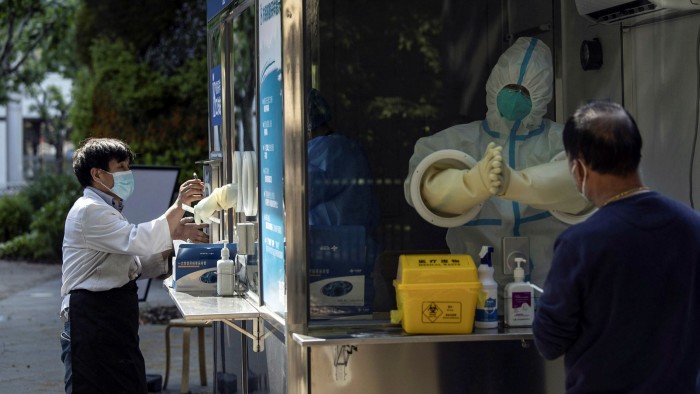Xi Jinping’s renewed commitment to zero-Covid rattles markets in China

Simply sign up to the Chinese politics & policy myFT Digest -- delivered directly to your inbox.
Xi Jinping has reaffirmed his commitment to China’s controversial zero-Covid strategy, warning against “any slackening” in the effort and vowing to crack down on criticism of the policy despite signs of damage to the economy.
The comments were published by state media after a meeting on Thursday of the Communist party’s politburo standing committee, the country’s most influential political body that is chaired by the president.
“Our prevention and control policies can withstand the test of history, our measures are scientific and effective. We have won the battle to defend Wuhan, we can also win the battle to defend Shanghai,” the statement said.
China’s leaders also signalled deeper concern with the vulnerabilities of the country’s healthcare system, noting a “great deal of uncertainty concerning how the pandemic will develop”.
“Relaxation will undoubtedly lead to massive numbers of infections, critical cases and deaths, seriously impacting economic and social development and people’s lives and health,” the statement said.
The direction set by China’s top political body bucks rising domestic and international criticism amid a series of lockdowns that have confined tens of millions of people to their homes across the country in an effort to stop the spread of the Omicron variant.
Ting Lu, Nomura’s chief China economist, noted that the politburo “did not mention” reconciling China’s focus on eliminating the virus with economic growth or minimising the damage to the economy, unlike previous meetings.
Xi’s high-profile endorsement of zero-Covid compounded the drag on markets, with global investors dumping stocks on concerns over the impact of future rate rises by the US Federal Reserve.
Chinese tech stocks that are heavily exposed to domestic consumer activity were among the hardest hit, with Alibaba tumbling more than 7 per cent and Tencent falling more than 5 per cent.
China’s CSI 300 index of Shanghai- and Shenzhen-listed stocks shed as much as 2.5 per cent, while in Hong Kong the benchmark Hang Seng index was down as much as 5.5 per cent.
“Market sentiment is still fragile,” said Dickie Wong, head of research at Kingston Securities. “The pandemic, the situation in Shanghai, it’s not over yet — although the Chinese government will do whatever they can to support the domestic economy.”
The renminbi also lost ground, dropping 0.3 per cent to about Rmb6.68 per dollar and leaving the currency down almost 5 per cent for the year to date.
The market moves came a day after data for April showed that China’s services sector suffered its second-worst contraction since the start of the pandemic, as lockdowns restricted movement in the world’s largest consumer market.
Goldman Sachs data showed that the proportion of cities with districts considered at mid to high risk of lockdowns contributed about 10 per cent of China’s gross domestic product.
Some health experts have warned that the zero-Covid approach is necessary because many of China’s hospitals remain poorly resourced and the country’s large elderly population is at a higher risk of severe illness because tens of millions of them are unvaccinated.
China has administered nearly 3.4bn Covid-19 vaccine doses to its population of 1.4bn. But the pace of inoculations has fallen to about 1.5mn doses per day over the past week from 5mn in recent months, as health officials have been forced to divert personnel and resources to mass testing campaigns, Goldman said.
Comments